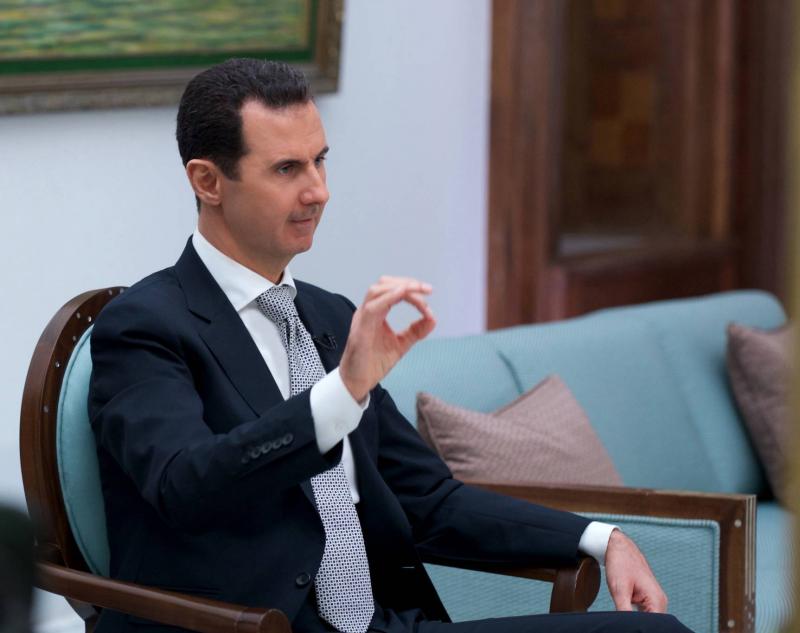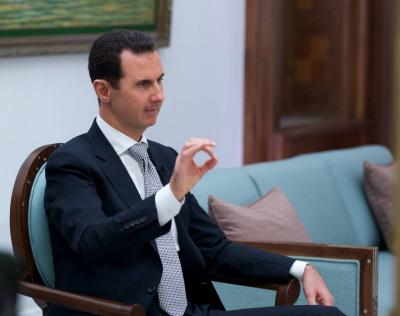Syrian President Bashar Assad stated on Monday that if a meeting with Turkish President Recep Tayyip Erdoğan leads to results that serve the interests of the country, he will proceed with it. In response to a question about the anticipated meeting with Erdoğan, Assad said: "From my position and from his position as officials at the pinnacle of power in our countries, if the meeting leads to results, whether it’s an embrace, admonition, or bearding, as it is colloquially said, that achieves the interest of the country, I will do it. However, the issue is not here; it's not about the meeting but about the content of the meeting. The proposition of the meeting may be important because it is a means to achieve a goal. What is the goal? We have not heard what the goal is. Resolving the issue? Improving relations? Restoring them to normal? The first question we ask is: why have relations deviated from their natural course for thirteen years? We have not heard any Turkish official addressing this point explicitly. Thus, as we have stated on numerous occasions, we are positive regarding any initiative to improve relations, and this is a natural thing. No one considers creating problems with their neighbors; however, this does not mean proceeding without principles. The meeting is a means, and the means require rules and frameworks to be effective; otherwise, it might worsen relations. The failure of this means at some point could make us head in a worse direction and pay a higher price. Therefore, Syria insists that the meeting is necessary regardless of the level. I am not talking about a meeting of presidents in general; meetings have not ceased; they are ongoing, and a meeting is being arranged at the security level by some intermediaries, and we have been positive about it. The Turkish Foreign Minister has stated that there are secret meetings, but there is nothing secret for us in Syria; everything is public. When there is a meeting, we will announce it; there is nothing secret. However, we have not seen results because there has not been political will, so we ask what the framework of the meeting will be. Will this framework be the elimination of the causes of the problem, which include supporting terrorism and withdrawal from Syrian territory? This is the essence of the problem; there is no other reason. If there is no discussion about this essence, what does the meeting mean? Therefore, we seek actions that yield results; we are not against any meeting or otherwise; what matters is that we achieve positive results that serve both Syria and Turkey's interests."
In response to a question about whether Syria is currently ready to normalize relations with Turkey and what the role of Syria's friends in this is, Assad said: "We have been using the term normalization incorrectly in recent years, regardless of whether one is for or against normalization. To say that we normalize to reach natural relations is contradictory because normalization is forced while natural is spontaneous. Normalization against the natural cannot coexist. We might use the term normalization with an abnormal enemy like Israel, a Zionist entity. To say we normalize is a coercive process because we want to impose natural relations that do not exist; however, when we talk about a neighboring country and a neighbor state with relations spanning centuries, the relations must be strictly natural. The term normalization is wrong. If we want to reach natural relations—of course, that is what we strive for in Syria regardless of what has happened—can occupation be part of natural relations between countries? Can supporting terrorism be part of natural relations between countries? This is impossible. When we talk about natural relations, we must exclude all that is abnormal from consideration. Occupation is abnormal, terrorism is abnormal, violating international law is abnormal, and disrespecting the sovereignty of neighboring and non-neighboring states is abnormal. When the abnormal issues are removed, the relationship will be natural without normalization, without coercive actions, and without government opinions; it will proceed in its natural form towards returning to what it was before the war, especially that these natural relationships have proven that the protection of the borders that Turkish officials talk about comes from these natural relations. As was previously the case, the borders were calm, and Syria has always been committed to what it has adhered to for more than a quarter of a century regarding security on both sides of the border and combating terrorism. Thus, we view the issue of natural relations with Turkey in this way."
He added: "Our friends are well aware of what we are talking about, and they have known this position since the first initiative that occurred five years ago. By the way, the discussion about initiatives is new, but the beginning of the initiatives was five years ago. Over these five years, we have repeated the same position: remove the causes, and results will appear; it does not need political or media theatrics. This relationship is natural; we will reach it, and friends support this, especially those who initiate this initiative to resolve the problems between us and Turkey are committed to international law. What we are demanding is a right for Syria, which is international law; no one can oppose it. Perhaps you sometimes demand certain actions; that is debatable and negotiable, but action is one thing, and surpassing the principle is another; the principles we build our national interests upon cannot be overlooked."
Assad continued: "Some talk about conditions; we do not set conditions, and some discuss demands—perhaps using softer language than conditions—but we do not make demands. What we are discussing is not conditions or demands; it is requirements, and the terminology is different. Anything in the world if we want it to achieve positive results must be provided with the appropriate environment, which is called requirements. If there is a political relationship, it requires specific requirements to yield results. If there is a partnership, a joint project between any group of individuals or companies, it also requires requirements. Therefore, without requirements, the process will not succeed... What we are discussing are the requirements that the nature of relations between countries imposes. This is expressed by international law. Here, we can return to the main point: can this relationship proceed without international law? Without explicitly discussing the past? Without addressing the political mistakes that led to the destruction of an entire region and the loss of hundreds of thousands of lives? Can we move towards the future without learning lessons from the past and establishing foundations to prevent future generations from falling into its traps?"
In response to a question about "guarantees from intermediary countries," Assad stated: "No guarantees have been provided to us, so we move positively but based on clear principles, not just principles—principles are international law and sovereignty; this is clear. But a specific methodology to ensure that what we are working on will lead to positive results. As I mentioned earlier, if we do not achieve positive results, the outcomes will be negative. Some say you will not lose anything. No, in this case, we either win or lose; at the common level, we and Turkey and our allies all either win or all lose. There is no middle ground; there is no gray area. Therefore, when we stress principles and requirements, it is out of our concern for the success of the process, not rigidity or hesitation. We have no hesitation; we are not arrogant like some; we have no arrogance. We seek our interest primarily, and our principles stem from our interrelated interests and are not separate from them."




